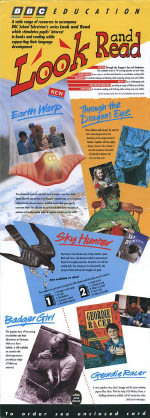
VIDEOS AND RECORDING
 |
|
VIDEOS AND RECORDING |
| SCHOOLS TV |
|
• Index • History • Videos & Recording • Longest Running • Worldwide |
| LOOK AND READ |
|
• Home > Stories Index > Downloads > Trivia > Schedules > Schools TV > Links > Site Admin (incl. Site Map) |
|
• Email • Discussion Forum • Guestbook • Help Out (Sorry, I can't provide videos or any other materials, so please don't write to ask!) |
 Various video recording devices available to schools in the 1970s: (from top to bottom) a Video Cassette Recorder, a Cartridge System and an open reel Video Tape Recorder
Various video recording devices available to schools in the 1970s: (from top to bottom) a Video Cassette Recorder, a Cartridge System and an open reel Video Tape Recorder |
 It's not mentioned on this page, but back in the 1960s, BBC Television broadcasts were made available to schools on filmstrip. Hire charge 20s each (Granada filmstrips were available for 12s 6d)
It's not mentioned on this page, but back in the 1960s, BBC Television broadcasts were made available to schools on filmstrip. Hire charge 20s each (Granada filmstrips were available for 12s 6d) |
1. Made by a teacher or student in the course of instruction;So if any of the delicate new equipment broke down, then legally teachers weren't allowed to ask their mate at the next school to lend them a copy of the missed programme; and also legally the recordings had to be made in the school, not round a teacher's or parent's house on their machine.
2. Used for instructional purposes only in the premises where they are made;
3. Destroyed within twelve months of their being made, or in the case of radiovision recordings by the end of the third school year
 BBC videos were released on the Educational Publishing label, with all the necessary idents and copyright details at the start.
BBC videos were released on the Educational Publishing label, with all the necessary idents and copyright details at the start.
|
 The early ITV Schools videos had nothing at all on the tapes apart from the raw programmes. The copyright disclaimer was given in a scrap of paper shoved into the video box.
The early ITV Schools videos had nothing at all on the tapes apart from the raw programmes. The copyright disclaimer was given in a scrap of paper shoved into the video box.
|
 A poster sent to schools in 1994, advertising available Look & Read resources - including two video packs.
A poster sent to schools in 1994, advertising available Look & Read resources - including two video packs.
|
|
SERIES |
ISBN |
||
| • | Through The Dragon's Eye |
|
|
| Sky Hunter II |
|
||
| Earth Warp |
|
||
| LRTV |
|
(only 8 episodes but still full price) | |
| • | Spywatch |
|
|
| • | Captain Crimson |
|
(only 8 episodes but still full price) |
| • | The Legend of the Lost Keys |
|
|
| • | Zzaap and the Word Master |
|
(only 6 episodes but still full price) |
| • | Spelling Strategies |
|
(only 3 episodes -- half price) |
| • | Spelling with the Spellits Year 3 |
|
(Video Pack includes notes, posters and PCMs) |
| • |
|
|
(Video Pack includes notes, posters and PCMs) |
| • |
|
|
(Video Pack includes notes, posters and PCMs) |
| THIS UNOFFICIAL WEBSITE HAS NO CONNECTION OF ANY KIND WITH LOOK AND READ OR WITH THE BBC. The Look and Read title and logo, as well as all related material, is copyright © BBC, 1967-2006. The official BBC Schools website is at www.bbc.co.uk/schools. Everything else on this website © Ben Clarke, 2000-2006. No malicious infringement of BBC copyrights is intended. Material featured at this site remains the property of the BBC or relevant copyright holders. |